
St Trinian's is a British gag cartoon comic strip series, created and drawn by Ronald Searle from 1946 until 1952. The cartoons all centre on a boarding school for girls, where the teachers are sadists and the girls are juvenile delinquents. The series was Searle's most famous work and inspired a popular series of comedy films.
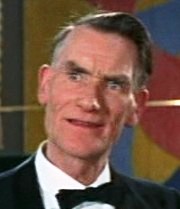
John Duncan Macrae was one of the leading Scottish actors of his generation. He worked mainly as a stage actor and also made five television appearances and seventeen films.
Sidney Gilliat was an English film director, producer and writer.
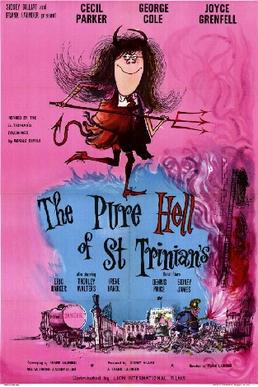
The Pure Hell of St Trinian's is a 1960 British comedy film directed by Frank Launder and starring Cecil Parker, George Cole, Joyce Grenfell and Eric Barker. It was written by Launder and Sidney Gilliat and set in the fictional St Trinian's School. It was the third in a series of four films.

Blue Murder at St Trinian's is a 1957 British comedy film, directed by Frank Launder, co-written by Launder and Sidney Gilliat, and starring Terry-Thomas, George Cole, Joyce Grenfell, Lionel Jeffries and Richard Wattis; the film also includes a brief cameo of Alastair Sim, reprising his lead role in the 1954 film, The Belles of St. Trinian's. Inspired by the St Trinian's School comic strips by British cartoonist Ronald Searle, the film is the second entry in the St. Trinian's film series, with its plot seeing the students of the fictional school making plans to secure a place on a European tour, all while subsequently aiding a criminal who is secretly seeking to escape the country with stolen jewels.
Frank Launder was a British writer, film director and producer, who made more than 40 films, many of them in collaboration with Sidney Gilliat.
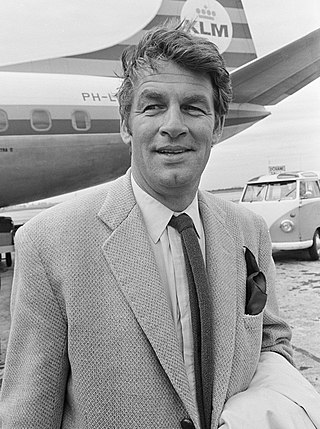
William Inglis Lindon Travers was a British actor, screenwriter, director and animal rights activist. Before his show business career, he served in the British Army with Gurkha and special forces units.
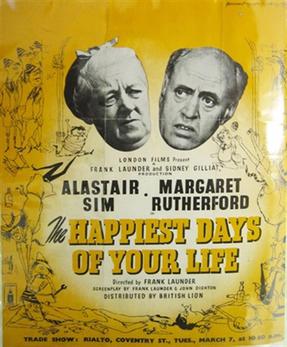
The Happiest Days of Your Life is a 1950 British comedy film directed by Frank Launder, based on the 1947 play of the same name by John Dighton. The two men also wrote the screenplay. It is one of a stable of classic British film comedies produced by Frank Launder and Sidney Gilliat for British Lion Film Corporation. The film was made on location in Liss and at Riverside Studios, London. In several respects, including some common casting, it was a precursor of the St. Trinian's films of the 1950s and 1960s.
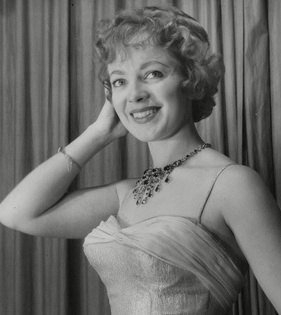
Patricia Bredin was an English actress and one-time singer. She is best known as the first representative of the United Kingdom in the Eurovision Song Contest.

David William Frederick Lodge was an English character actor.

Geordie is a 1955 British film directed and co-produced by Frank Launder, with Bill Travers in the title role as a Scotsman who becomes an athlete and competes at the 1956 Summer Olympics in Melbourne.

British Lion Films is a film production and distribution company active under several forms since 1919. Originally known as British Lion Film Corporation Ltd, it entered receivership on 1 June 1954. From 29 January 1955 to 1976, the company was known as British Lion Films Ltd, and was a pure distribution company.

Bridal Path is a novel by Scottish author Nigel Tranter, first published in 1952. In 1959 a film version The Bridal Path was released.
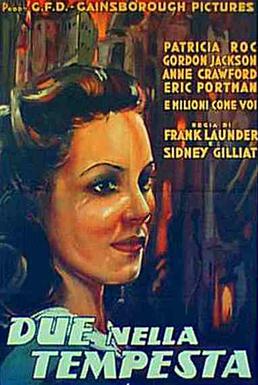
Millions Like Us is a 1943 British propaganda film, showing life in a wartime aircraft factory in documentary detail. It stars Patricia Roc, Gordon Jackson, Anne Crawford, Basil Radford, Naunton Wayne, Moore Marriott and Eric Portman.

The Wildcats of St Trinian's is the fifth British comedy film set in the fictional St Trinian's School. Directed by Frank Launder, it was released in 1980.

I See a Dark Stranger – released as The Adventuress in the United States – is a 1946 British World War II spy film with touches of light comedy, starring Deborah Kerr and Trevor Howard. It was written and produced by the team of Frank Launder and Sidney Gilliat, with Launder directing.

Serious Charge is a 1959 British film, directed by Terence Young and starring Anthony Quayle, Sarah Churchill, Andrew Ray and Irene Browne. It was produced and co-written by Mickey Delamar and Guy Elmes, and adapted from the 1956 stage play of the same name by Philip King. The film is notable for the screen acting debut of Cliff Richard in a minor role.

Payroll is a 1961 British neo-noir crime thriller film directed by Sidney Hayers and starring Michael Craig, Françoise Prévost, and Billie Whitelaw. The screenplay, written by George Baxt was adapted from Derek Bickerton's 1959 novel of the same name. The film revolves around a group of criminals who plan and execute a wages robbery, which ultimately ends in disaster.

Left Right and Centre is a 1959 British satirical comedy film directed by Sidney Gilliat and starring Ian Carmichael, Patricia Bredin, Richard Wattis, Eric Barker and Alastair Sim. It was produced by Frank Launder. A political comedy, it follows the events of a by-election in a small English town.

Albert Edward Walker Evans was an English film and television actor.


















